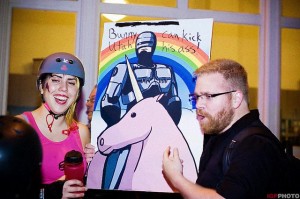I recently read a good book on the history of the development of modern strategy in football. It taught me a great deal about innovation in team sports, coaching, and other lessons useful to the fan, athlete, and coach of any sport. (I have often advised that watching other team sports will make the typical derby player a better athlete, and I maintain that now more than ever.) Something that kept creeping into my mind as I read about the mature state of football after 100 plus years, was that roller derby is still in its infancy, despite (sort of) being 75 plus years old.
Although derby has its roots in what some would consider ancient history, having been conceived as something vaguely resembling what is played today in 1935, there has been practically no continuity of information or tradition among players, fans, and support staff. Such information is typically archived and shared among generations in other sports, but this has been lacking in any meaningful way for roller derby. Sure a few books and movies have survived, but their impact on today’s sport has been minimal. For all intents and purposes, our version of derby really is only seven or so years old. In dog years, quite mature, but in sport years, still very much an infant.
What this means is that the sport is changing rapidly, and it is going to continue to do so for a long time. If there is something you don’t like today (too mainstream? not mainstream enough? crappy rules? silly tournament structure?), all ya gotta do is wait around and see what it looks like in a few months. You might also be wise to learn a little history, or re-familiarize yourself with some of the things that were going on in derby as little as two years ago. The other thing to keep in mind about this is that the future is wide open, both on and off the track.
With few exceptions, the best teams, athletes, and coaches in roller derby today have barely begun to scratch the surface of what is possible in terms of skill and strategy. You think Gotham, Oly and Rocky Mountain are good now, wait until you see what teams are doing five years from now. I can’t predict exactly how the strategies will change, but trust me the derby we watch in the future is gonna look different. Four years ago who would have predicted the development and efficacy of the “slow derby” strategy?
Speaking of which, are you one of those that hate “slow derby?” In all likelihood, there will either be rules changes and/or strategy adjustments that make it irrelevant within months (the former being more likely if history is an indicator; rule changes have often been initiated as handicaps for dominant teams.) But then again, maybe everyone will be playing slow derby tomorrow.
Consider that the top three teams today were nowhere on the national radar just four years ago, when Texas, Rat City, and Tucson were among the most dominant teams in the nation. Oly didn’t even exist, Gotham was pretty average, and Rocky Mountain was not very good in early 2007 (Gotham really didn’t start making waves until the Heartland Havoc tournament in August 2007.) Even the best performances we have witnessed so far don’t capture what is possible when teams and players have been working on a common goal for multiple years.
This goes for individual skater, as well. Your favorite skater right now could be better- a lot better. Suzy Hotrod, who is widely regarded as one of the best players in the sport, has publicly stated that she had no formal training or athletic experience prior to joining Gotham. As unstoppable as she is now, if she gets a little formal training imagine how much better she might become? I have seen minor tweaks in form work wonders for a good skaters overall ability. On the other hand, consider Atomatrix, a world champion speed skater, and derby player. Yet, if you observe her decision-making on the track, it’s clear she still hasn’t quite grasped roller derby strategy. In fact, the Oly Rollers as a team don’t seem to have grasped some basic principles of the sport; imagine how good they will be when their mental skills match or exceed their skate skills? It gives me goose bumps…
As far as the business and off-the-track side of roller derby goes, the sky is the limit. I won’t go into detail here, but the way derby teams, leagues and even the WFTDA operate today will change drastically in coming years. The individual personalities of those involved in decision making will change with every election and with it the basic governing philosophy and goals will change. No league is so stable that it is beyond being a manifestation of the personalities of its leaders.
So if things in derby today seem silly, stagnant, boring, or self-destructive (whether on the track or behind the scenes), just wait around, all this will be different in a couple years. Things may get worse before they get better, or vice versa, but the sport is evolving.
